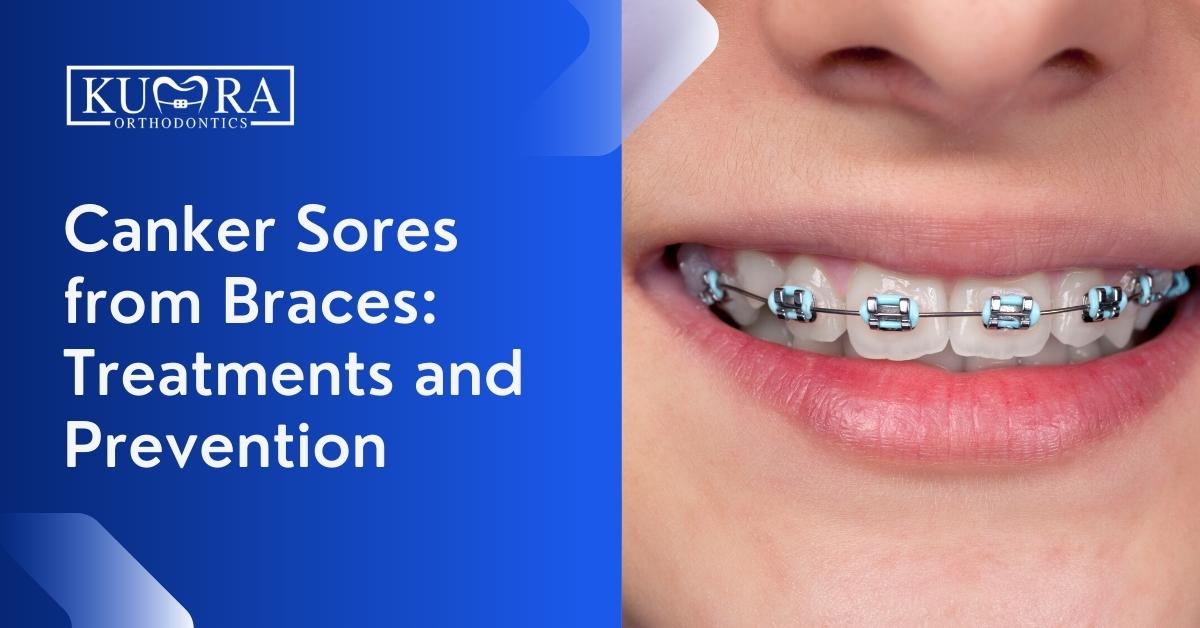A few days or weeks after initiating orthodontic treatment, you discover that you have canker sores. The good news is that, although occasionally painful, the sores are typically not dangerous. Canker sores are a typical occurrence, often known as orthodontic side effects. Canker sores are tiny ulcers that occur within the inner mouth. They are capable of causing tingling and burning sensations.
These sores are circular and white, gray, or red in appearance. In addition, it can cause moderate discomfort and may heal independently after a while. However, they can also cause severe infections and health problems.
In this article, we’ll address the canker sores from braces and guide how you can prevent it and alleviate your discomfort.
What are Canker Sores?
According to the American Academy of Oral Medicine (AAOM), canker sores (recurrent aphthous stomatitis, RAS) are among the most prevalent oral disorders, affecting about fifty percent of the population. Typically, these small, round or oval, yellowish lesions occur throughout adolescence.
Typically, they affect the delicate, mobile portions of the mouth, including the tongue, soft palate, cheeks, and lips. This is a recurrent ailment since these sores typically heal on their own, only to resurface in the same or different areas after a period of time. In extreme cases, old ulcers may heal while new ulcers are developing.
Typically, canker sores are self-limiting. This indicates that the symptoms will disappear even without treatment. Unknown is the etiology of canker sores. However, in other cases, they may indicate other problems affecting the body (such as a gastrointestinal disease). Inform your physician if you suffer exhaustion, abdomen pain, fever, eye discomfort, or rashes or sores on other parts of your body.
Is It Normal To Get Canker Sores With Braces?
Unfortunately, orthodontic appliances can cause canker sores. This typically occurs in patients who are already susceptible to canker sores. When they begin orthodontic treatment, they may notice increased mouth sores since their mouth is adjusting to a significant shift. Braces can irritate oral tissue, making it susceptible to the development of canker sores and other microscopic lesions.
Fortunately, avoiding potential triggers and maintaining proper dental hygiene can help you prevent or reduce canker sores.
Some individuals, particularly those who are already susceptible to canker sores, suffer an increase in sores after receiving braces. This may be because your mouth is adjusting to a significant change, or because braces can irritate oral tissue, leaving it susceptible to small sores and infections.
Needing an orthodontic appointment?
Visit Kumra Orthodontics Washington, DC or Kumra Orthodontics Stafford, VA, and request an appointment with us!
Triggers
Avoiding other potential triggers and practicing proper oral hygiene will help reduce the incidence of canker sores and alleviate a sore mouth.
Stress
In times of stress, the immune system is more vulnerable, making it easier for canker sores to develop and irritate the mouth.
Tissue Injury
If you already have wounds or scratches in your mouth (for example, biting your cheek), you are more susceptible to canker sores.
Foods
Canker sores can be triggered by acidic foods such as strawberries, tomatoes, pineapples, and lemons. Sour candies are another major offender.
Sickness
If you currently have an infection in your body, developing canker sores increases.
Some Simple Remedies Once you identify your triggers, avoiding canker sores becomes simpler. Limit unhealthy meals. If your braces are irritating your mouth, request additional dental wax or have the problem areas examined. If stress is causing canker sores, you should use stress-reduction tactics.
If you are still experiencing regular canker sores after examining your triggers, examine your oral hygiene regimen.
Treatments
There are numerous over-the-counter and prescription drugs and home cures that promise to provide relief for those who suffer from canker sores.
Simple cases of occasional canker sores heal independently and vanish without intervention. Canker sores cannot be altered or prevented from recurring with current treatments; instead, the focus is on reducing symptoms like pain and discomfort and any long-term problems.
The treatment of canker sores focuses on relieving symptoms, lowering inflammation, and boosting the healing process by preventing side consequences, such as bacterial infection, that could slow it down.
The following may be used as treatments: steroid mouth rinses, topical anesthetics, antiseptic ointments/rinses, and nutritional supplements.
- To treat your canker sores, purchase an over-the-counter medication such as Anbesol, Milk of Magnesia, or Oragel. Utilize a cotton swab for application. Apply it three to four times per day. If your child is younger than two years old, see your doctor about administering analgesics.
- Take a pain reliever, such as aspirin, ibuprofen (such as Advil), or naproxen, which are non-steroidal anti-inflammatory medications (NSAIDs) (such as Aleve).
- Due to the risk of Reye syndrome, do not administer aspirin to anyone under the age of 18. Be careful with medications. Follow all instructions listed on the label.
Prevention
Avoiding other potential triggers and practicing proper oral hygiene will help reduce the incidence of canker sores and alleviate a sore mouth.
- Staying hydrated is a simple and healthful method for preventing canker sores. This is because a dry mouth might increase irritation caused by braces. On the other hand, water consumption stimulates the production of saliva, which contains antibodies that inhibit the spread of canker sores. Preventing canker sores and being hydrated go hand in hand, which is why it’s essential to carry a water bottle with you at all times.
- You should gargle with saltwater. Dissolve 5 grams (1 teaspoon) of salt in 250 milliliters (1 cup) of warm water.
- Additionally, orthodontic wax prevents mouth ulcers. When you apply orthodontic wax to your braces, the surface will become softer. It prevents sharp bracket corners and wires from making contact with your mouth. This wax is waterproof and slip-resistant. Therefore, it provides longer-lasting relief. Before applying, warm a tiny bit of wax with your fingertips for a few seconds.
Consult with Kumra Orthodontics to learn more about canker sore from braces
Although canker sores are often a minor annoyance, they can be very painful and make it difficult to eat or speak. If you are experiencing pain from canker sores, consult with Kumra Orthodontics to learn more about how braces may help to alleviate this pain.



